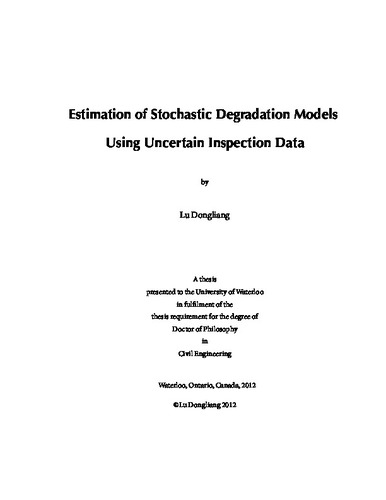| dc.description.abstract | Degradation of components and structures is a major threat to the safety and reliability of large engineering systems, such as the railway networks or the nuclear power plants. Periodic inspection and maintenance are thus required to ensure that the system is in good condition for continued service. A key element for the optimal inspection and maintenance is to accurately model and forecast the degradation progress, such that inspection and preventive maintenance can be scheduled accordingly.
In recently years, probabilistic models based on stochastic process have become increasingly popular in degradation modelling, due to their flexibility in modelling both the temporal and sample uncertainties of the degradation. However, because of the often complex structure of stochastic degradation models, accurate estimate of the model parameters can be quite difficult, especially when the inspection data are noisy or incomplete. Not considering the effect of uncertain inspection data is likely to result in biased parameter estimates and therefore erroneous predictions of future degradation.
The main objective of the thesis is to develop formal methods for the parameter estimation of stochastic degradation models using uncertain inspection data. Three typical stochastic models are considered. They are the random rate model, the gamma process model and the Poisson process model, among which the random rate model and the gamma process model are used to model the flaw growth, and the Poisson process model is used to model the flaw generation. Likelihood functions of the three stochastic models given noisy or incomplete inspection data are derived, from which maximum likelihood estimates can be obtained.
The thesis also investigates Bayesian inference of the stochastic degradation models. The most notable advantage of Bayesian inference over classical point estimates is its ability to incorporate background information in the estimation process, which is especially useful when inspection data are scarce.
A major obstacle for accurate parameter inference of stochastic models from uncertain inspection data is the computational difficulties of the likelihood evaluation, as it often involves calculation of high dimensional integrals or large number of convolutions. To overcome the computational difficulties, a number of numerical methods are developed in the thesis. For example, for the gamma process model subject to sizing error, an efficient maximum likelihood method is developed using the Genz's transform and quasi-Monte Carlo simulation. A Markov Chain Monte Carlo simulation with sizing error as auxiliary variables is developed for the Poisson flaw generation model, A sequential Bayesian updating using approximate Bayesian computation and weighted samples is also developed for Bayesian inference of the gamma process subject to sizing error.
Examples on the degradation of nuclear power plant components are presented to illustrate the use of the stochastic degradation models using practical uncertain inspection data. It is shown from the examples that the proposed methods are very effective in terms of accuracy and computational efficiency. | en |

